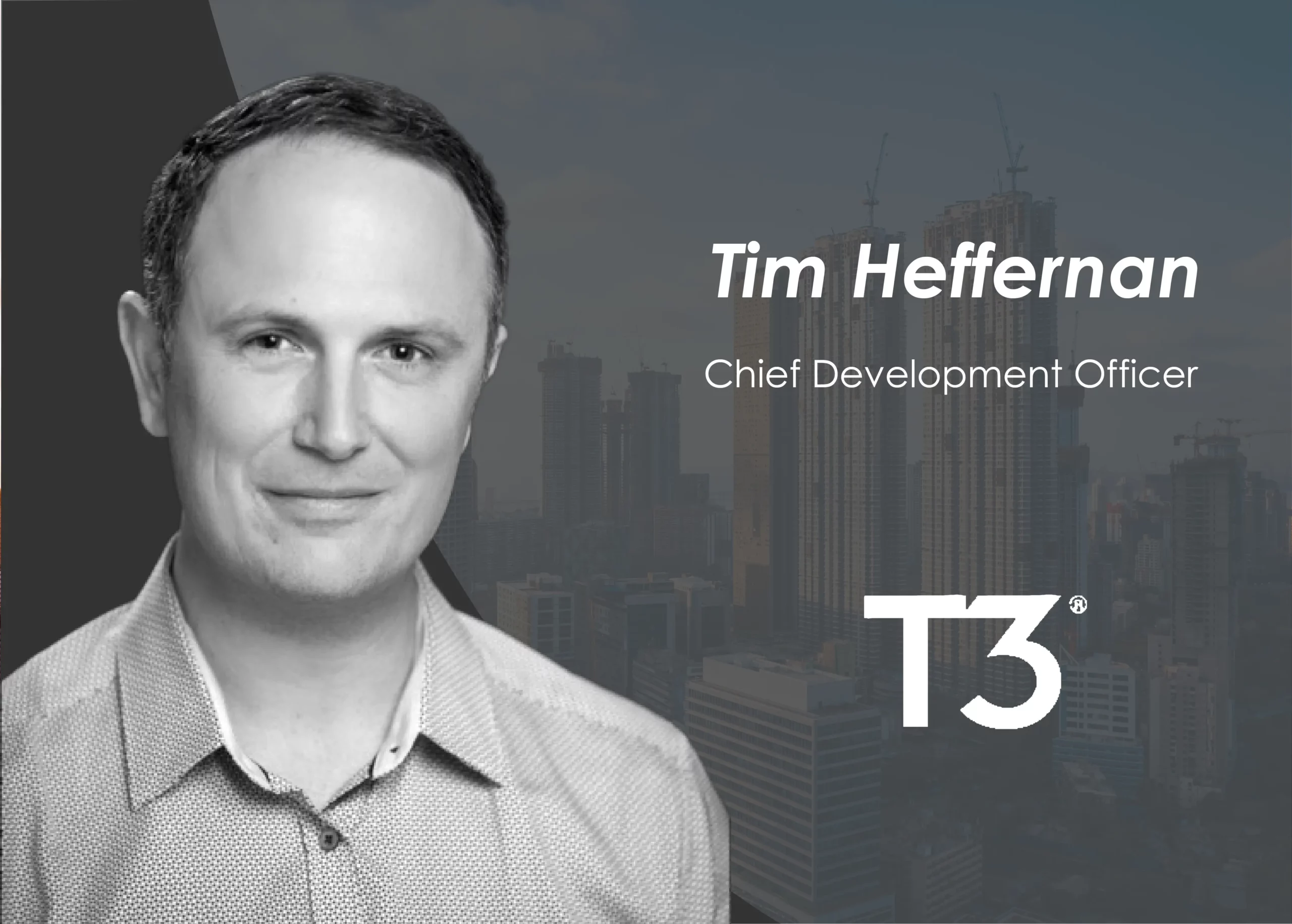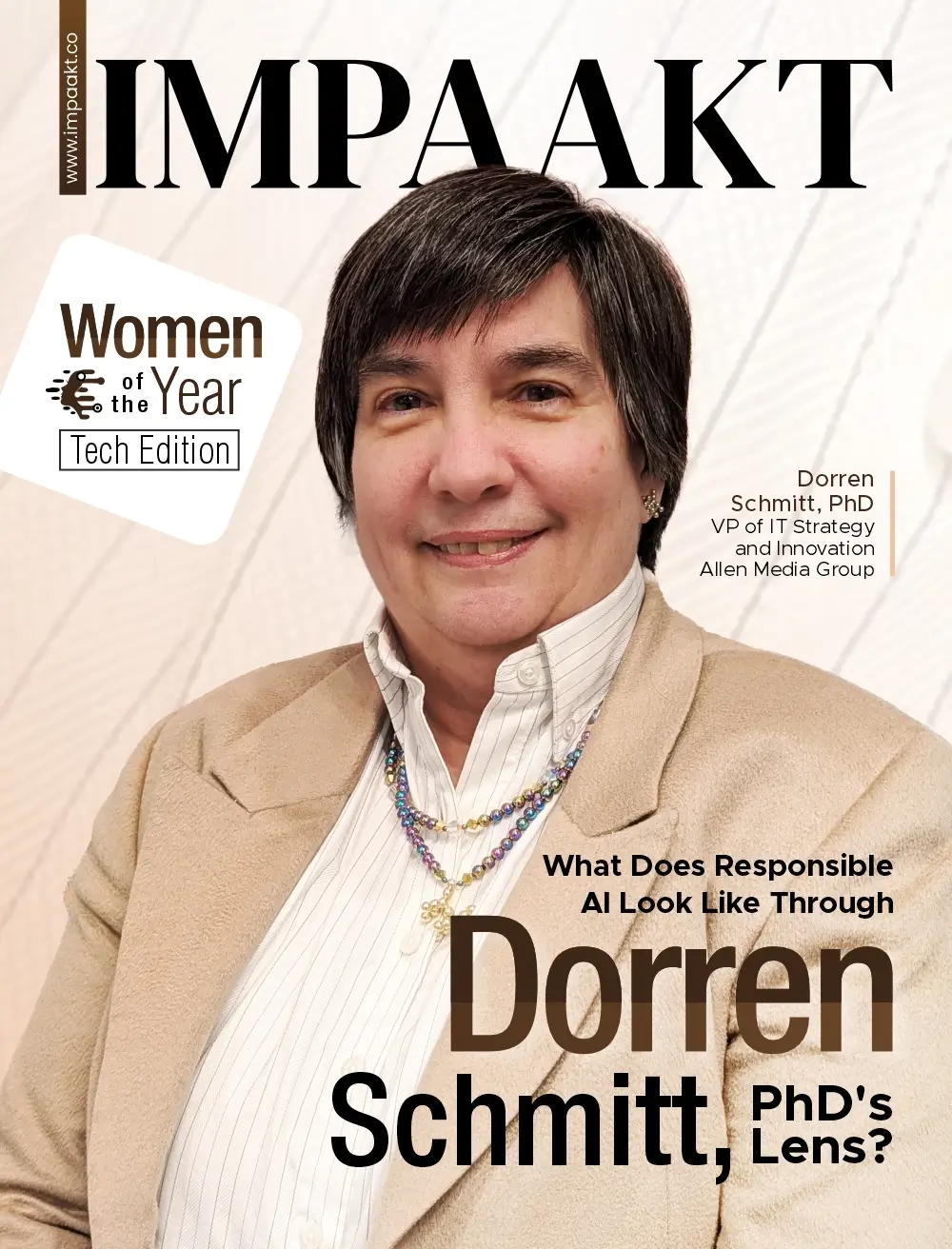In the dynamic landscape of global events and exhibitions, where every spectacle tells a story and every engagement is an experience, the need for innovation and sustainability has never been more pronounced.
One individual who is driving sustainable innovation in this space caught our eyes. Meet Tim Heffernan, the Chief Development Officer of T3 Expo. At T3 Expo, Tim navigates the intricate intersection of technology, sustainability, and experiential engagement with remarkable finesse.
With a career spanning decades, Tim’s journey is filled with diverse experiences and significant achievements. From his early forays into policy-driven growth initiatives to his pivotal role in navigating T3 Expo through the tumultuous waters of the pandemic, every step has shaped him into the visionary leader he is today.
We, at Impaakt, had the chance to delve into his journey. Below are the excerpts of the interview:
Tim, can you share a significant milestone or moment in your career that has shaped your leadership style and contributed to your current role as CXO at T3 Expo?
One pivotal moment occurred during my tenure as Vice President of Government Relations & Emerging Business Opportunities at NCR. It was a way to bring the lessons of driving policy-driven growth initiatives, within the United States and global governments, to an intrapreneurial function of a newly created cross-functional internal incubation engine. This experience taught me the importance of strategic vision, proactive engagement with stakeholders, and the ability to navigate complex global landscapes to drive tangible results. These lessons have profoundly influenced my leadership style and continue to inform my approach as Chief Growth and Development Officer at T3 Expo where resilience, strategic agility, and innovation are paramount in navigating challenges and driving meaningful impact for our customers.
In your experience within the events and exhibitions sector, what challenges have you encountered, and how have these challenges influenced your approach to leadership and decision-making at T3 Expo?
The pandemic. It was critical that I honed many of my prior roles into one to help navigate our company, our industry, franchises, and small businesses through it. In doing so we worked on the first draft of the Paycheck Protection Program (PPP), the earned income tax credit (ERTC), and PPP2 for industries like ours that were shut down for 18 months. Like most in our industry, we pivoted and did what we needed to keep the company afloat. For us that meant building the first field hospital at the Javits Center in New York City, building PPE desk shields, pivoting to virtual events, and working with the International Franchise Association through their seat on the White House Working Group to reopen the country for all franchise businesses. In the end, the challenges that you aren’t “trained for” are the ones that provide the most learning that spur action for what you are.
Through these various challenges, they have underscored the importance of agility, creativity, and customer-centricity in decision-making and leadership. At T3 Expo, we prioritize agility and innovation, continually adapting our strategies and offerings to meet evolving client needs and industry trends. By fostering a culture of flexibility and collaboration, we navigate challenges with resilience and drive positive outcomes for our clients and stakeholders.
Through the International Franchise Association, we served on the White House Working Group to help safely reopen the country and created plans on how to do so, while keeping track of what was required by the state in order to do so.
Looking ahead to 2024, what technological advancements or upgrades do you anticipate will have a significant impact on the events and exhibitions industry, and how is T3 Expo preparing for these changes?
Everyone is talking about AI much in the same way they did about VR and AR a few years ago. While all technologies have their relative places on the Gartner hype cycle, this will be different as it will impact every industry.
With any new technology, it’s a tool that makes a process faster. If you have a flawed process, or worse a flawed value proposition, AI will just make you fail at a greater rate with potentially worse consequences.
For example, one of the most promising parts of AI-powered large language models (LLMs) is being missed by most brands. While the auto-generated text, they create from a few simple prompts can seem like magic, they aren’t giving the LLMs the right inputs to generate an emotional connection with their audiences. To do so brands need to go beyond Net Promoter Scores and seek what are the emotional drivers that connect with audiences to feed the LLMs. The technologies being created today that provide this emotional intimacy at scale will be the next wave of one-to-one marketing. For the event industry, it will be about harnessing the right process combined with the right technologies that will lead to unique engagements with attendees that create an emotional connection.
At T3 Expo, we are proactively investing in these technologies and partnering with innovative vendors to integrate them into our offerings. By embracing technological advancements, we position ourselves as leaders in delivering cutting-edge solutions that meet the evolving needs of our clients and enhance the overall event experience.
Given the growing importance of sustainability, how does T3 Expo incorporate eco-friendly practices into its operations, and what sustainability initiatives do you foresee becoming integral to the events and exhibitions industry in the coming years?
Sustainability is a core value at T3 Expo, and we are committed to incorporating eco-friendly practices into our operations. This includes minimizing waste, reducing energy consumption, and sourcing sustainable materials for our exhibits and displays. We also prioritize partnerships with vendors and suppliers who share our commitment to sustainability. Looking ahead, I foresee sustainability initiatives becoming even more integral to the events and exhibitions industry, driven by increasing awareness of environmental issues and consumer demand for eco-friendly solutions.
Sustainability, like technological advancements, really forces you to look at your processes and how you can make them better to achieve your goals. For us that is everything from how we create structures, to how we re-use them, to how we design them to be easily shipped to reduce truckloads.
For example, we have created ‘transformer kiosks’ where the cabinets can fold flat for storage and shipping. This reduces the space needed in trailers to carry them to shows, thereby reducing the number of trucks needed to deliver them and reducing emissions. This type of thinking is what we do across all of our products and leads to sustainable outcomes that reduce emissions and trucking costs.
Can you share a personal anecdote or experience that reflects your commitment to both technology and sustainability and how it has influenced your professional journey at T3 Expo?
In a word, jugaaḍ. That is the Indian term for a creative hack to make things work or to create new things with little resources. I was introduced to this when searching for a new Center of Excellence innovation hub during my tenure at NCR. After reinvesting in the US by moving the HQ to Atlanta and insourcing manufacturing to Columbus, GA, we were looking to create innovation centers in the different markets we served. While traveling to India to pick the location I was shown a jugaad for watering one’s lawn. While an American would simply go to a garden store and buy a hose and sprinkler, this was too expensive for the Indian market. They took a 2-liter Pepsi bottle, taped the hose to the spout, mounted it on a tripod, and then poked holes into the bottle. They turned the water on, and they had their solution for watering their lawn.
This thinking taught me two things: first innovation means different things in different places, and second it doesn’t have to be expensive. By using this type of thinking, we were able to put an ATM in every city, at a tenth of the cost of a full-feature ATM.
It also makes you think holistically about sustainability. Meaning if I can get an ATM in every town, that will reduce carbon emissions because people no longer need to travel to another town to receive their money.
What is your opinion on the role of sustainable business practices in the success and longevity of companies today, and how do you see this perspective evolving in the future, particularly within the events and exhibitions sector?
Sustainable business practices are still very important to the success and longevity of companies today, as they not only mitigate environmental impact but also drive operational efficiency, enhance brand reputation, and attract socially conscious consumers. In the events and exhibitions sector, sustainability has become increasingly important, as stakeholders prioritize eco-friendly solutions and demand transparency in supply chains. I believe that companies that prioritize sustainability will not only thrive in the short term but also position themselves for long-term success by aligning with evolving consumer values and regulatory requirements. Moving forward, I anticipate sustainability will become even more central to business strategy, with companies leveraging technology and innovation to minimize environmental footprint and create positive social impact.
In your view, how can technology be leveraged to drive and enhance sustainability efforts within T3 Expo and the broader events and exhibitions industry?
Technology plays a crucial role in driving and enhancing these efforts within T3 Expo and the broader events and exhibitions industry. In addition to the transformer furniture example above, we leverage technology in various ways to reduce environmental impact and promote sustainability. For instance, we invest in energy-efficient lighting systems, reusable exhibit components, and sustainable materials to reduce resource consumption and carbon emissions.
Could you highlight a specific achievement or initiative at T3 Expo that you are particularly proud of, aligning with the themes of sustainability and tech leadership?
We’ve spearheaded efforts to repurpose and recycle show graphics and signage, partnering with companies to transform banners and signs into new products like duffle bags and backpacks. Many of our products, including our innovative Presta magnetic wall technology, not only streamline setup and breakdown processes but also optimize packing efficiency, reducing the number of trucks required for transportation and minimizing carbon emissions.
What advice or insights would you offer to emerge leaders who aspire to make a positive impact in both the tech and sustainability domains within the events and exhibitions sector?
For emerging leaders aspiring to make a positive impact in both the tech and sustainability domains within the events and exhibitions sector, my advice would be to embrace innovation, collaboration, and continuous learning. Stay informed about the latest trends and developments in technology and sustainability and seek out opportunities to integrate these principles into your business practices. Foster partnerships with like-minded organizations and industry stakeholders to amplify your impact and drive collective action. Remember that sustainability is not just a trend but a fundamental aspect of responsible business practices and prioritize long-term value creation over short-term gains. By staying true to your values and leveraging technology for sustainable innovation, you can make a meaningful difference in the industry and contribute to a more sustainable future.
As someone with considerable experience, what key pieces of advice would you give to budding entrepreneurs looking to make a mark in the events and exhibitions industry with a focus on technology and sustainability?
My key pieces of advice for budding entrepreneurs would be to prioritize customer-centric innovation, agility, and collaboration. Work on your value proposition first, then how you are going to deliver it in a consistent repeatable manner. By focusing on value, process, and then technology, you will be successful faster and in a more meaningful way than those who put technology first. You cannot automate your way out of a flawed process and can’t deliver something great to customers if you aren’t providing them with something they truly crave and makes their lives better.

 More about Tim Heffernan
More about Tim Heffernan










